what is canada doing in haiti?
Darren Ell
Commentary
In January 2006, just prior to the Haitian elections, Montreal Photographer Darren Ell began a long-term photographic project in Haiti. Here is his first report and photo essay.
The coup d'état is not just an American art. Canada is wading knee deep in Haitian blood and only citizen groups are talking about it. In 2003, Canada helped set in motion a process that led to the violent overthrow of democratically elected Haitian President Jean-Bertrand Aristide. Canadian politicians held high-level international meetings to discuss his removal, then participated in a massive defamation campaign to weaken his credibility. We joined in as the international community withheld critical aid money that broke the back of the Western Hemisphere’s poorest country. Then, as criminal elements of the former Haitian army overran the country, breaking their friends out of jail and murdering police officers and civilians, Canada refused Aristide’s plea for help. Canadian troops only appeared on the ground in time to secure the airport for Aristide's arranged US flight to exile in February 2004.
 |
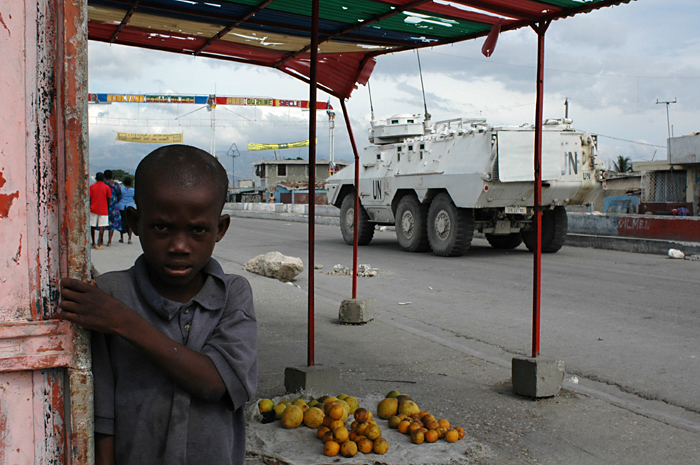 |
A UN soldier guards the Hotel Montana where the body of UN military Commander Urano Bacellar was found on January 7th, 2006. His temporary replacement and eventual second in command of UN forces, General Aldunate, has been linked to death squads of Chilean dictator Augusto Pinochet.
© 2006 Darren Ell |
A young Haitian boy bearing signs of malnutrition stands near a UN APC in Cite Soleil. The actions of the UN have had the effect of keeping an unpopular illegitimate governement in place, one which has let living standards drop even further in Western World's poorest nation.
© 2006 Darren Ell |
What followed the coup was a horrific wave of repression that saw thousands of supporters and officials of Aristide’s movement – Lavalas – murdered or jailed. Throughout this period, members of the RCMP were in Haiti to help train the dreaded Haitian National Police (HNP). They integrated former members of the murderous Haitian Army, and not surprisingly, the HNP was soon involved in numerous massacres, under the watchful eye of the UN stabilization forces (MINUSTAH). As political prisoners languished in jail, including the former Prime Minister Yvon Neptune, Paul Martin showed up in Haiti to proclaim that there were no political prisoners in Haiti. Human rights organizations counted over 700. During my recent January 2006 trip to the country, I personally sat in the Petionville Prison with 200 of them, all women who were locked up in 2004 when the HNP raided their neighbourhood looking for their husbands. The husbands were hiding, so they locked up the wives and daughters. They've been there ever since.
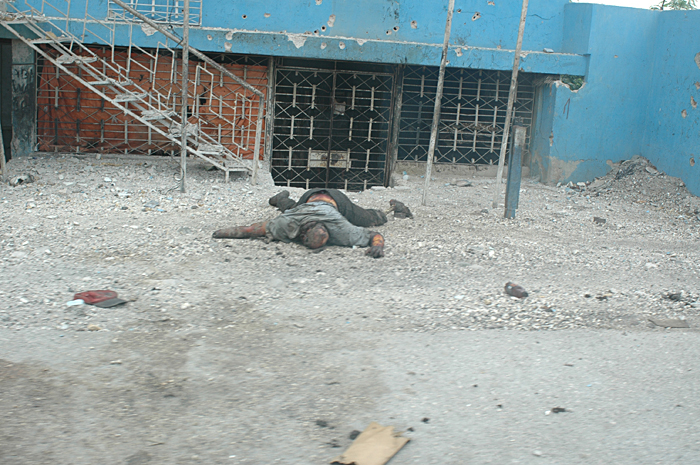 |
 |
Zapada Price, a man described as "fou" (crazy) by the community, ventured too close to the UN checkpoints in Cite Soleil. His body lay for four days because every time his family came to collect the corpse, UN troops reportedly fired on them.
© 2006 Darren Ell |
A resident of Cite Soleil who refused to give his name out of fear of reprisals describes the UN massacre of July 6, 2005 in Cite Soleil and more recent attacks on his community.
© 2006 Darren Ell |
In Haiti, I also encountered the disastrous UN presence. I helped cover the story of the alleged suicide of the UN military commander while there, who was found dead only hours after a tense meeting with top Haitian business elite members Andy Apaid and Reginald Boulos. Ever since the coup, the very rich have been pressuring the UN to crack down on the "bandits" in the poor neighbourhoods of the country. The poor have no illusions what this means: "bandits" or "terrorists" as they are sometimes called are supporters of the Lavalas movement to which the recent Presidential winner René Préval is affiliated. As my photo essay shows, the UN has often responded to elite pressures, like during my stay when they opened fire on civilians in the Bwa Neuf Market Place in the desperate slum of Cite Soleil; or on July 6, 2005 when hundreds of troops stormed the same neighbourhood, killing and wounding dozens.
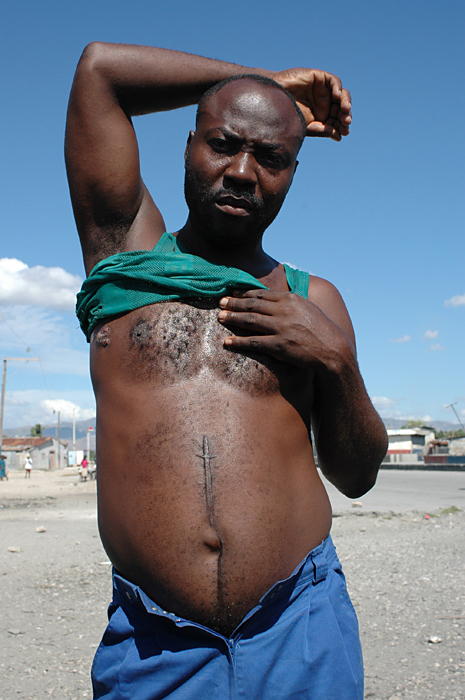 |
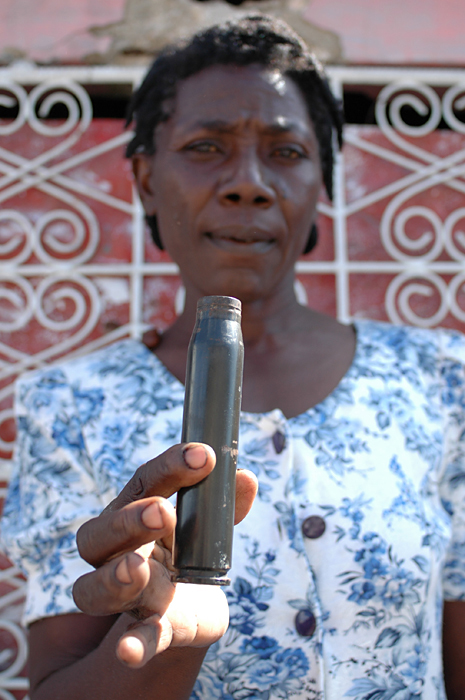 |
Cite Soleil resident Amavil Joudain was shot in the stomach by UN forces on July 6, 2005. Joudain told local journalist Kevin Pina: "My brother has been shot and killed by the UN, my cousin was shot and killed by the UN on July 6. Look at my stomach and the operation they performed to save my life. The UN is lying!".
© 2006 Darren Ell |
Cite Soleil residents came forward with a variety of bullets and shell casings fired by UN forces into the neighborhood. This woman holds a shell designed to pierce walls and armor.
© 2006 Darren Ell |
Jean-Charles Moise, popular political organizer and former mayor of the village of Milot, best described the UN presence in Haiti. I said to him: "The UN says they are here to 'stabilize' the country. What type of instability will occur if they leave Haiti tomorrow?" His answer was swift and clear: "Haitians will descend en masse to the National Palace and demand the departure of the illegitimate Latortue government and a return to democracy. The UN is only here to protect the Latortue regime." Perhaps he was right: When they finally got their say this February, the people of Haiti threw out installed PM Gerald Latortue’s government and voted overwhelmingly for René Préval, despite two years of terror telling them not to do so. Yes, you got that right: the Haitian people voted overwhelmingly for the political movement Canada helped violently undermine in 2004. No runner-up got more than 16% of the vote.
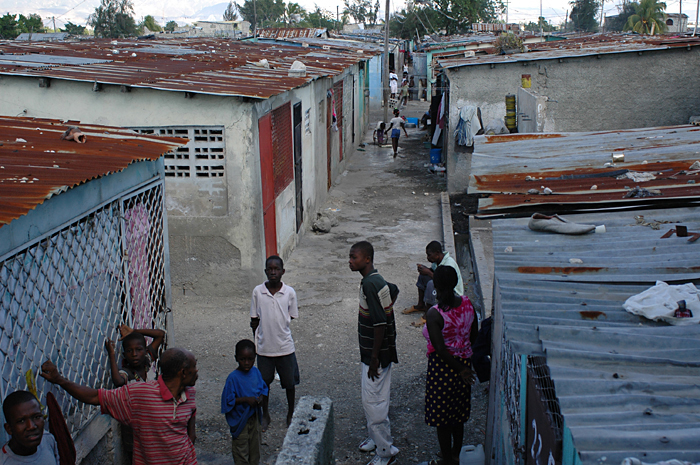 |
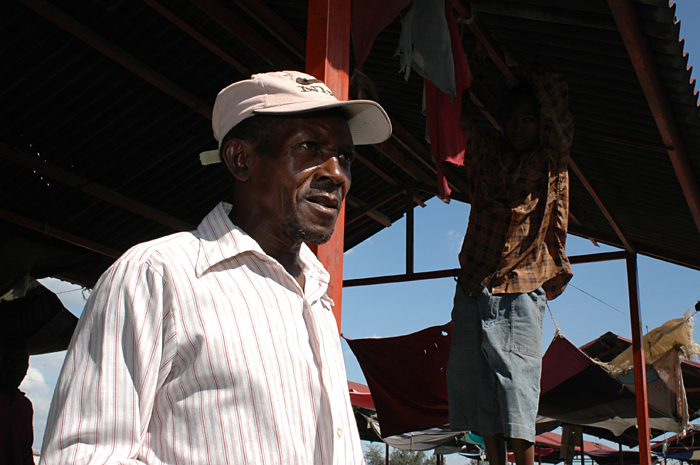 |
Nearly half the population of Cite Soleil has fled in fear from the seaside slum since the Canadian-backed coup of 2004. Like all impoverished neighborthoods in Haiti, voters massively support Lavalas candidates and are therefore subjected to violent repression.
© 2006 Darren Ell |
Dieunord Edme described to journalist Kevin Pina how his wife Annette Moleon was gunned down by UN forces on January 6, 2006, two days before my arrival in Haiti. "They started shooting everywhere for no reason. They killed my wife and have left me to take care of our nine children. Why did they do that?"
© 2006 Darren Ell |
Is this the new Canada in the world? Is this the best we can do for Haiti? Haiti is desperately poor. There is no functioning electrical grid in the country. Unemployment hovers at 80%. Life expectancy has dropped below 50. Average daily income is two dollars a day. Half the country is illiterate. Malnutrition is rising. People are traumatized from a half-century of brutal dictatorship and a massive repression in the early 90's that left thousands dead. Try to imagine how our lives would be affected if this scale of turmoil descended on our communities for just one month. I have not met one Canadian who believes Haiti’s conditions or our government’s responses are acceptable. Yet I have yet to hear a single word out of the mouth of any politician in this country - left, right or centre - about this state of affairs.
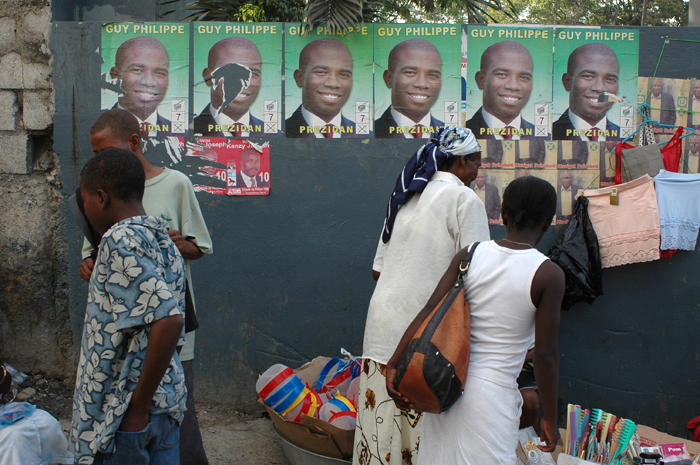 |
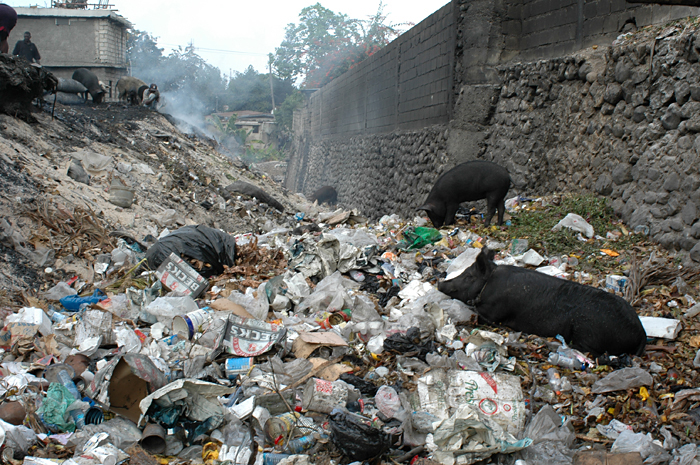 |
Presidential candidate Guy Philippe has the death of thousands on his hands as a military leader in the Canadian-backed 2004 overthrow of democratically elected President Jean-Bertrand Aristide.; The coup Prime Minister; Gerald Latortue; who recently met with Jean Charest and Stephen Harper; referred to Philippe as a "freedom fighter."
© 2006 Darren Ell |
There is no organized garbage collection in Haiti. The country is in desperate need of help to build its infrastructure, improve the health of its citizens and to strengthen its fragile democracy. Is supporting a violent coup against a popular elected leader who was trying to do just that the best Canada can do?
© 2006 Darren Ell |
On the contrary, our politicians are meeting with the man who oversaw two years of slaughter: Gerald Latortue. Several weeks ago, he was in Canada to meet with Jean Charest and Stephen Harper. Why was he not arrested on war crimes charges? That is a fair and rational question to ask. Maybe he’s too busy to catch: he just signed a secret deal in New York to grant unprecedented powers to the hated UN forces in Haiti and has been busy stacking the judiciary with his henchmen. A gift for Haiti’s returned democracy.
 |
 |
Andy Apaid, spokesperson for the "Group 184" introduces unpopular elitist presidential candidates on January 18th. Group 184 worked for the overthrow of Aristide in 2004 and supports the repression of Lavalas supporters in the slums of Port au Prince.
© 2006 Darren Ell |
Three weeks prior to the election, disgruntled Haitian citizens listened to speeches by presidential candidates representing Haiti's tiny but powerful business class, whose favored candidate earned only 12% of the vote.
© 2006 Darren Ell |
To learn more about Canada and Haiti, there are two crucial sources. Canada in Haiti: Waging War on the Poor Majority (2005) by Yves Engler and Anthony Fenton is tremendously informative. The other source is the HaitiAction.Net website, a fantastic source of news and analysis on events in Haiti, and where a selection of these photos were first published in conjunction with Kevin Pina’s Haiti Information Project in January 2006.
END
